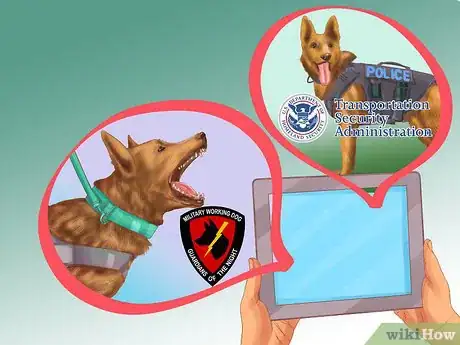This article was co-authored by Belgin Altundag. Belgin Altundag is a Certified Dog Trainer and the Owner of Happy Doggies Day Care/Day Camp in West Hollywood, California. A passionate animal lover, Belgin is knowledgeable about multiple training styles, including obedience training, problem-solving, activity training, and behavior modification. In addition to being an Animal Behavior College’s Certified Dog Trainer (ABCDT), Belgin has also completed the Training Cesar's Way Fundamentals of Dog Behavior and Training Programs 1 and 2 and is certified by the American Red Cross in Cat and Dog First-Aid.
There are 9 references cited in this article, which can be found at the bottom of the page.
This article has been viewed 81,877 times.
Adopting a trained dog will save you money and time. Trained dogs tend to be a bit older, but they can found in many places locally and online. Shelters are full of dogs that have at least some previous training. Visiting a shelter can help you interact and find the perfect dog for your lifestyle. Of course, if you are looking for a specially trained service dog, you should fill out an application with a local training organization. Remember that trained dogs come with their own challenges. Be patient with your new dog as you both learn about each others' habits, personalities, and behaviors.
Steps
Searching for Trained Dogs
-
1Look online. There are many places online where people can post ads for dogs that need homes. Many of these dogs will have had previous homes, and they may be trained already.[1] Enter keywords such as "trained dog," “adult dog,” or “housetrained” into the search field to view a list of trained dogs being sold or offered new homes in your local area. Some websites you might try include:
-
2Call local breeders. If you are looking for a puppy, your options may be more limited.[2] You may have some luck, however, calling the breeders in your area and asking them if they housetrain their puppies. While some breeders expect the new owners to train the puppies, there are some who will train the puppies from a young age. Call local breeders in your area to find out what options are available to you.[3]Advertisement
-
3Consult with animal rescue organizations. Some rescue organizations will train their dogs to help find them new homes.[4] Contact rescue organizations in your area to see if they offer obedience training to their dogs. Even if they don't train the dogs themselves, let them know about your interest in a trained dog. They may have dogs that were trained before joining them.
-
4Adopt a retired work dog. Working dogs are those employed by agencies for security or detection work. These dogs may be adopted from the organizations that once employed them. As they are retired dogs, they may be a little older.
- Military Working Dogs were trained for use in the army. They have been deemed safe to live in a normal household environment and may be adopted for free from the Military Working Dog School in Texas.
- Occasionally, police departments or security organizations, such as the Transportation Security Administration (TSA), will offer retired work dogs for adoption.
- Service dog training organizations occasionally have younger dogs who were trained but who did not fulfill all of the requirements of their certification. They usually have been trained well enough to live in a normal home.
-
5Ask a vet or trainer. Occasionally, vets or trainers will know of people who are looking to rehome their dogs. You can ask your vet or call a local dog training academy to see if they know of anyone who needs a home for a trained dog.
- While training academies typically do not sell trained dogs themselves, they can still point you in the right direction. Furthermore, by contacting them, you might find a good trainer to help you if you do end up buying an untrained dog.
Adopting a Trained Dog from the Shelter
-
1Research adoptable dogs online. Most shelters will post profiles of their dogs on their website. Before you visit the shelter in person, read through their website so that you can identify dogs who might be a good fit for you. Some may even let you search for trained dogs. You might look for a dog advertised as being housebroken, leash trained, or good with children.
-
2Talk to the staff. Inform the staff members at an animal shelter that you are looking for a dog that has already been trained. In most cases, the staff members will be familiar with the personality and history of every dog that resides in the shelter. They can introduce you to dogs that are trained. You might ask them:[5]
- Do you have any dogs that are already housetrained?
- Which dogs are good with children?
- May I see dogs that are leash-trained?
- Are there any dogs that have been crate trained already?
- Which dogs have lived in a house or apartment before?
- Are there any dogs that already respond to their name?
- Which dogs are responsive to commands?
- Was this dog a stray or surrendered by their owner? If they were given up, why?
-
3Look at older dogs. Older dogs are more likely to be house and leash trained, and they may even know some basic commands. They will also be easier to take care of than younger dogs, as they will not have the behavioral or chewing problems of puppies. When at the shelter, consider adopting a senior dog.
- Keep in mind that older dogs may have more health issues than younger dogs.
- It may take a few weeks for your dog to feel comfortable around you after adoption. This does not necessarily mean that they are poorly trained, but rather that you will still need to take the time to bond with and interact with your new pet.[6]
-
4Visit with the dog. Many shelters will have an area where you can visit and play with the dog to see if their temperament suits you. This is a good opportunity to test the dog's training. Try out a few commands with the dog, such as “come here” and “sit.” Get to know the dog, so that you can make an informed decision.
- Remember that the dog may respond to many different commands. Try several out to see which they answer to. For example, say “sit,” “down,” “lie down,” and “stay” to see which one works on the dog.
- Older dogs may be anxious around new people. You may never know what happened to them before they came to the shelter, and living in a kennel can be traumatic. Remember to keep an open mind and be patient with these dogs. With time and care, they may turn into a loving pet.
Finding a Service Dog
-
1Locate a service training organization that fits your needs. There are many different types of service dogs, all trained to deal with different emotional and physical needs.[7] Search online for service dogs who can help you with your daily needs. You can consult with a vet, doctor, or physical therapist for recommendations.
- The American Kennel club offers a listing of approved service dog organizations.
-
2Contact the organization. Each organization will have a unique set of procedures for adopting a trained dog from them. You should contact as many of these organizations as you can to find a dog that is best-suited for your lifestyle and needs. Furthermore, many organizations have waiting lists, so you should factor time into your decision. When you contact them, you should ask:[8]
- “How long is your waiting list?”
- “Do you offer training programs to the new owners to help them bond with the service animal?”
- “Why type of certification and documentation do you offer for the dog?”
- “How are the dogs trained? Are they housebroken? Crate trained?”
- “How much will it cost to buy a service dog from you?”
- “How old will the dog be when they are released to me?”
- “What are the procedures for adopting?”
-
3Fill out the application. Once you have determined which organization you want to adopt from, you will normally have to fill out an application. You may be asked to do a background check before being placed on the waiting list. Once you have submitted the application, you will have to wait for your turn to receive a dog. In some cases, it can take up to two years to receive a dog.
-
4Save up money to purchase the dog. It is very expensive to train a service dog. Some organizations do not charge for service dogs while others may request several thousand dollars to cover training and costs.[9] Once you are given an estimate of the cost for your service dog, you can begin saving your money and looking for financial assistance.
- The Assistance Dog United Campaign is a charity that helps raise funds so that eligible people can afford their service dogs.
- You may have some luck using a crowdfunding website, such as GoFundMe or YouCaring, to help raise the money.[10]
- You can claim any expenses toward buying or taking care of a service dog on your taxes.[11]
Expert Q&A
-
QuestionCan rescue dogs be trained?
 Belgin AltundagBelgin Altundag is a Certified Dog Trainer and the Owner of Happy Doggies Day Care/Day Camp in West Hollywood, California. A passionate animal lover, Belgin is knowledgeable about multiple training styles, including obedience training, problem-solving, activity training, and behavior modification. In addition to being an Animal Behavior College’s Certified Dog Trainer (ABCDT), Belgin has also completed the Training Cesar's Way Fundamentals of Dog Behavior and Training Programs 1 and 2 and is certified by the American Red Cross in Cat and Dog First-Aid.
Belgin AltundagBelgin Altundag is a Certified Dog Trainer and the Owner of Happy Doggies Day Care/Day Camp in West Hollywood, California. A passionate animal lover, Belgin is knowledgeable about multiple training styles, including obedience training, problem-solving, activity training, and behavior modification. In addition to being an Animal Behavior College’s Certified Dog Trainer (ABCDT), Belgin has also completed the Training Cesar's Way Fundamentals of Dog Behavior and Training Programs 1 and 2 and is certified by the American Red Cross in Cat and Dog First-Aid.
Certified Dog Trainer Yes they can! If you're buying or adopting a rescue, chances are that it may already have been trained by its previous owner or by the animal shelter.
Yes they can! If you're buying or adopting a rescue, chances are that it may already have been trained by its previous owner or by the animal shelter. -
QuestionCan you buy a dog already house trained?
 Belgin AltundagBelgin Altundag is a Certified Dog Trainer and the Owner of Happy Doggies Day Care/Day Camp in West Hollywood, California. A passionate animal lover, Belgin is knowledgeable about multiple training styles, including obedience training, problem-solving, activity training, and behavior modification. In addition to being an Animal Behavior College’s Certified Dog Trainer (ABCDT), Belgin has also completed the Training Cesar's Way Fundamentals of Dog Behavior and Training Programs 1 and 2 and is certified by the American Red Cross in Cat and Dog First-Aid.
Belgin AltundagBelgin Altundag is a Certified Dog Trainer and the Owner of Happy Doggies Day Care/Day Camp in West Hollywood, California. A passionate animal lover, Belgin is knowledgeable about multiple training styles, including obedience training, problem-solving, activity training, and behavior modification. In addition to being an Animal Behavior College’s Certified Dog Trainer (ABCDT), Belgin has also completed the Training Cesar's Way Fundamentals of Dog Behavior and Training Programs 1 and 2 and is certified by the American Red Cross in Cat and Dog First-Aid.
Certified Dog Trainer Yes, it all depends on the breeder. Adopting a rescue dog may be your best chance of bringing home a dog that has a good training foundation and understanding of the basic stuff like house training.
Yes, it all depends on the breeder. Adopting a rescue dog may be your best chance of bringing home a dog that has a good training foundation and understanding of the basic stuff like house training. -
QuestionI'm looking for a service dog for because I have early-onset Alzheimers. Where can I buy one?
 Community AnswerAsk your local vet or look up service dogs in your area online.
Community AnswerAsk your local vet or look up service dogs in your area online.
Warnings
- While a shelter can help you identify a dog's history, you may never be entirely certain of how a dog was trained in the past.⧼thumbs_response⧽
- If a dog is untrained, try to avoid abandoning them in a shelter, as there many dogs in shelters waiting for homes. Instead, try to train them yourself or send them to a training academy.⧼thumbs_response⧽
References
- ↑ Belgin Altundag. Certified Dog Trainer. Expert Interview. 11 August 2021
- ↑ Belgin Altundag. Certified Dog Trainer. Expert Interview. 11 August 2021
- ↑ https://www.dogstardaily.com/blogs/dr-ian-dunbar/why-purchase-puppy-not-housetrained
- ↑ Belgin Altundag. Certified Dog Trainer. Expert Interview. 11 August 2021
- ↑ http://www.humanesociety.org/issues/adopt/tips/adoption_questions_shelter_staff.html
- ↑ https://www.petfinder.com/dogs/bringing-a-dog-home/tips-for-first-30-days-dog/
- ↑ http://www.akc.org/public-education/resources/service-therapy-work-dogs/
- ↑ https://www.keystonehumanservices.org/susquehanna-service-dogs/faq.php#t13
- ↑ https://www.keystonehumanservices.org/susquehanna-service-dogs/faq.php#t13
About This Article
To buy an already-trained dog, try searching for trained dogs on websites like Petfinder and ASPCA. You can also reach out to local animal shelters and let them know you're interested in adopting a trained dog. If you're OK with adopting an older dog, consider getting a retired work dog, like a former police or military dog, since they're well trained. Also, ask local vets and dog trainers if they know of anyone who's looking to rehome their trained dog. For tips on how to find a trained service dog, scroll down!







































































